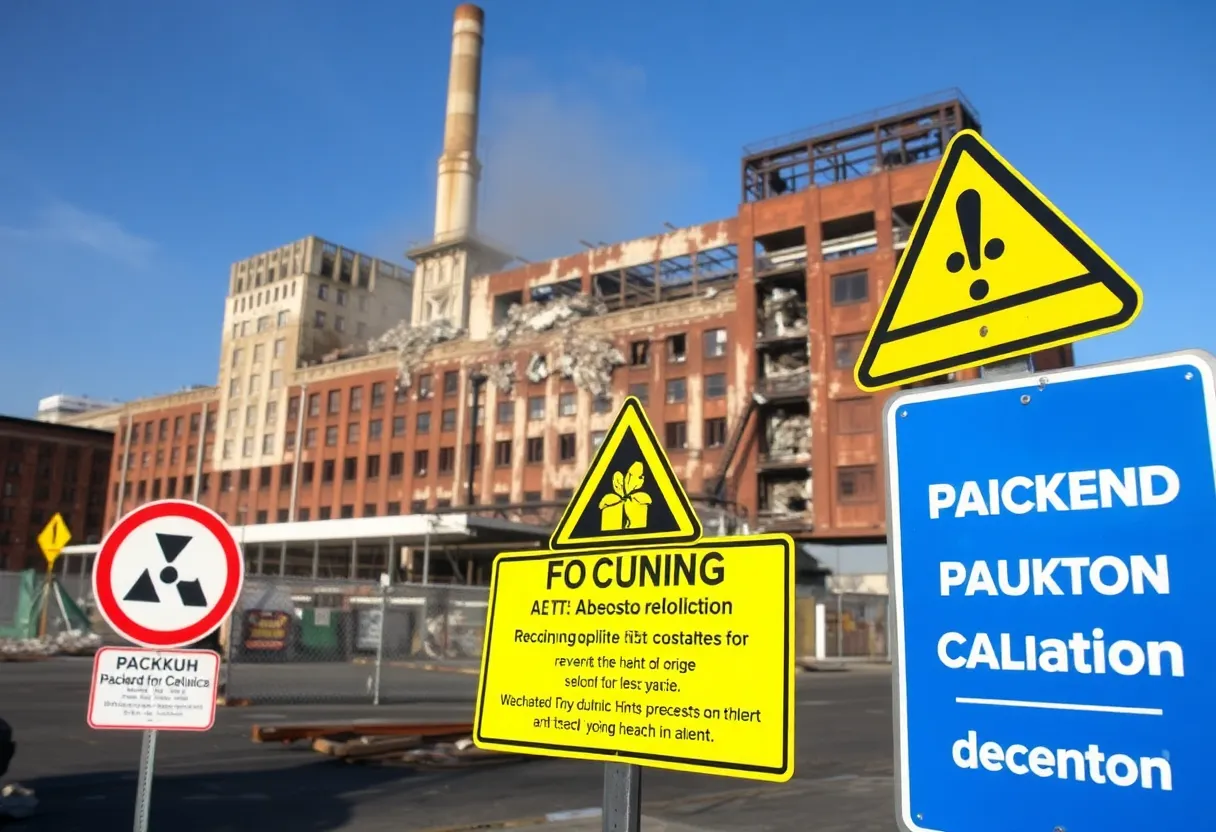News Summary
The demolition of the Packard Plant raises concerns over asbestos exposure in Detroit, revealing alarming gaps in safety protocols amid regulatory failures.
Asbestos Crisis Looms Over Detroit: Health Risks and Regulatory Failures Emerge
As the scheduled demolition of the iconic Packard Plant in Detroit kicks off, ominous signs mark the site: asbestos warning signs dot the landscape, heralding potential dangers for workers and the community alike. As of January 24, 2023, this high-profile demolition has ignited fresh concerns surrounding the handling of asbestos, an infamous material linked to severe health risks, including lung cancer and mesothelioma.
Schools Under Scrutiny for Asbestos Inspections
In a related vein, an audit conducted by the New York City Comptroller has cast an alarming spotlight on public schools across the city. Revealing that only 257 schools were inspected for asbestos between 2021 and 2024, this finding highlights a critical gap in safety protocols. Federal law mandates that all public schools perform asbestos inspections every three years, yet it seems that adherence to these regulations remains wildly inconsistent.
Contractor Violations Rock Detroit’s Asbestos Abatement Efforts
In a concerning development, the Detroit Office of Inspector General (OIG) has barred contractor David Gillespie from operating for a staggering 20 years. His offenses include working alongside another debarred contractor during asbestos removal efforts, casting doubt on the safety measures in place during such high-stakes renovation projects. Gillespie, who once enjoyed a favorable reputation as a local success story, was implicated in fraud and violations affecting over 150 properties in Flint, Michigan. Due to his negligence, public health safety became a genuine concern.
City of Detroit Faces Criticism Over Asbestos Violations
The city is currently facing scrutiny from the Michigan Department of Environmental Quality (DEQ), which has sought fines for numerous asbestos violations occurring during demolition activities. Since 2014, the DEQ has issued penalties related to over 100 properties where the proper handling of asbestos was evidently ignored. The scale of non-compliance suggests a systemic issue that could lead to consent orders or significant judgments against the city.
Health Risks Associated with Asbestos Exposure
The health implications connected to asbestos exposure are grave. Asbestos fibers, when inhaled, can lead to dire health consequences including mesothelioma, a particularly aggressive form of cancer, and other ailments such as asbestosis. Inspections conducted by the DEQ have unveiled shocking instances of negligence, even revealing that several properties still contained asbestos despite being cleared for demolition. Out of 113 DEQ inspections related to asbestos, 12 buildings posed safety risks due to these violations.
Contractor Accountability and Community Safety
In response to these overwhelming issues, the city has taken steps to initiate inspections and enforce disciplinary measures against contractors found guilty of violations. Suspensions and debarments have impacted several firms, including Brown Environmental Construction and Professional Asbestos Services, which faced penalties for failing to comply with regulations. Yet, the question remains—how effective are the oversight mechanisms employed by state agencies like the DEQ and MIOSHA?
Calls for Tighter Regulations
Despite the substantial funding of over $200 million directed towards the city’s demolition program, compliance issues persist, prompting investigations from both state and federal bodies. It is critical that local residents are kept informed about potential health hazards linked to improper demolition practices. The ongoing risks posed by asbestos and its link to serious health conditions necessitate stringent regulation and compliance in demolition efforts.
As the situation unfolds, community safety hangs in the balance. The need for increased transparency and adherence to established guidelines in dealings with hazardous materials has never been more pressing. Only through rigorous enforcement and responsible management can the specter of asbestos-related ailments be diminished, ensuring a safer environment for all.
Deeper Dive: News & Info About This Topic
HERE Resources
Asbestos Concerns Loom Over Bethlehem Public Library Renovation Plans
Tragic Loss: Asbestos-related Cancer Claims Life of Wiltshire Man
Asbestos Temporarily Stored at Temescal Gateway Park Amid Wildfire Cleanup Efforts
New Laws May Threaten Mesothelioma Payouts
NYC Schools Face Critical Asbestos Inspection Backlog
Demolition of Hotel O in Jackson Marks a New Chapter for Community Safety
Shock Audit Reveals Asbestos Inspection Failures in New York City Schools
New York City Schools Fail to Meet Asbestos Inspection Requirements
Understanding Mesothelioma Prognosis: Key Factors
Whittaker, Clark, & Daniels Faces Backlash Over Mesothelioma Claims Amid Bankruptcy
Additional Resources
- The Detroit News: Environmental Solutions and Contractor Debarment
- Wikipedia: Asbestos
- Detroit Free Press: Asbestos Concerns in Demolition
- Google Search: Asbestos Health Risks
- Deadline Detroit: Asbestos Company Suspension
- Google Scholar: Asbestos Exposure Health Effects
- The Detroit News: City Fined for Environmental Failures
- Encyclopedia Britannica: Asbestos



















